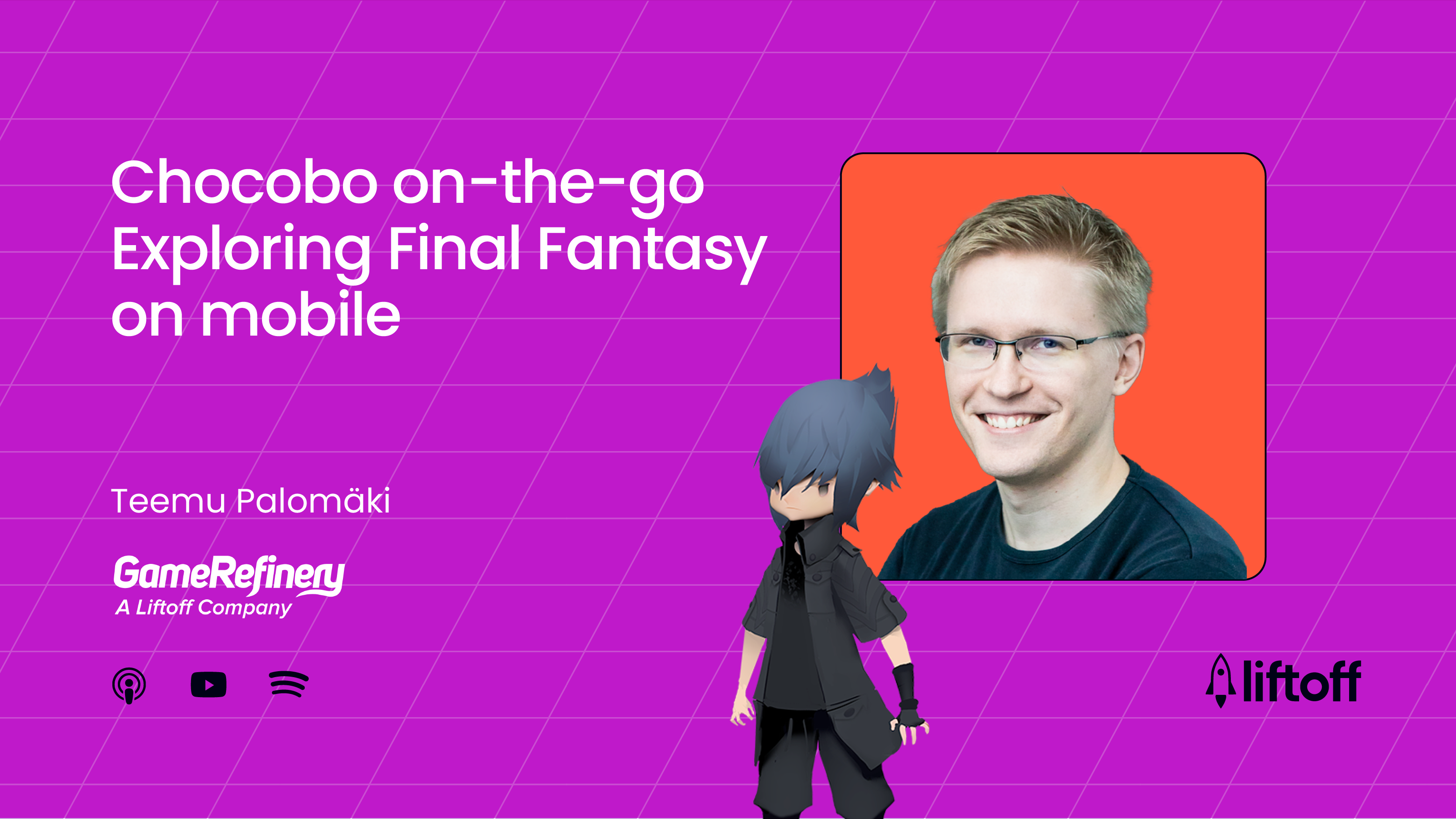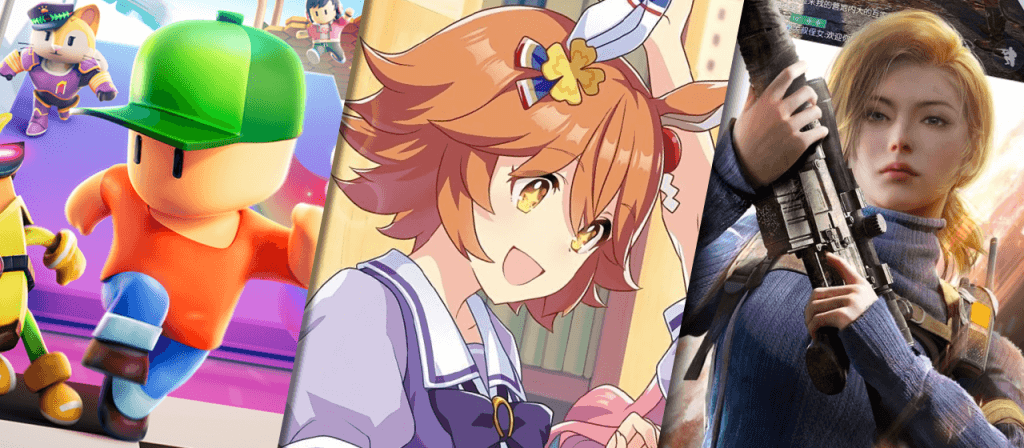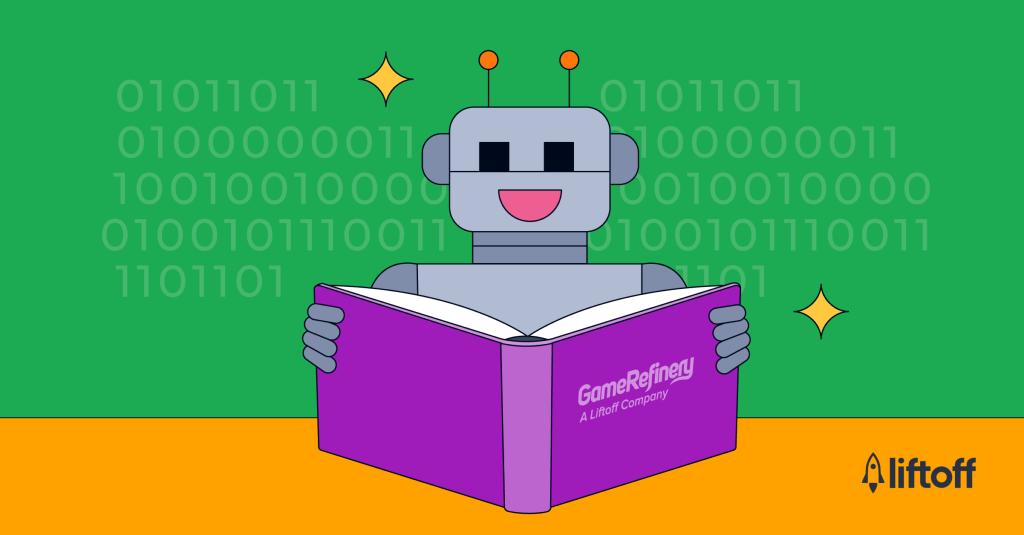Join us as we explore the exciting world of Final Fantasy. In this episode, we’ll uncover the legacy of this iconic franchise within the JRPG genre and its transformative impact on the world of mobile games. From its inception to its latest mobile adaptations, we’ll discuss Final Fantasy’s remarkable evolution and ability to captivate a new generation of gamers.
![]()
![]() Spotify, BuzzSprout, TuneInRadio, iHeartRadio
Spotify, BuzzSprout, TuneInRadio, iHeartRadio
– If you enjoy the episode, remember to hit subscribe!
We’ll look into how Final Fantasy’s success in mobile gaming is tied to its monetization strategies and what truly sets Final Fantasy games apart, from their captivating stories and immersive gameplay to their stunning visuals. Beyond the technical aspects, we’ll examine the immense impact of the Final Fantasy brand on both the gaming world and popular culture.
You can also watch the episode on YouTube:
Topics we will cover in this episode:
- Introduction
- What makes Final Fantasy special
- Hits and misses in the Final Fantasy series
- Comparison of Japanese and Western audiences
- The flexibility of the Final Fantasy IP
- Experimentation with the IP
- Utilizing source material for success
- Comparing Final Fantasy and Dragon Quest
- Music and nostalgia in Final Fantasy
- Final Fantasy VII: Ever Crisis
- Monetization in Ever Crisis
- Gacha mechanics in Japanese gaming culture
- Unique weapon rarity levels
- Premium games and mobile releases
- Conclusions for developers
- Experimentation and mini-games
Read transcript
Introduction
[00:00:00] Jon Jordan: Hello and welcome to the Mobile Games Playbook. Thanks for tuning in for another episode. This is a podcast all about what makes a great mobile game, what is and isn’t working for mobile game designers, and all of the latest trends. I’m your host, Jon Jordan, and joining me today; We have one expert, but what an expert he is, Teemu Palomaki. Good to have you back on, Teemu. Your official title is Chief Game Analyst Japan for Game Refinery, and you are talking about one of the most defining, I guess, Japanese games today. So you are the perfect man for this. Tell us what we need to know about Final Fantasy.
[00:00:36] Teemu Palomäki: Great to be here talking about it. I’ve played a lot of them. I’m hoping I will be able to shed some light on things that could be helpful for non-Final Fantasy developers today.
[00:00:54] Jon: Yes, it’s a massive subject, and it’s one of the longest-running. I mean, whether you see it as an interesting franchise, isn’t it? Because pretty much most of the games are single games, but to some degree in some shared universe. Then there are some direct sequels, but then there’s an awful lot of side-quests and multimedia, and over time, that’s become bigger. Very interesting from that point of view. Also, we’re timing this now because Final Fantasy VII: Ever Crisis has fairly recently been released as a mobile game. Again, that’s another retelling of the classic Final Fantasy VII game as well. That will be something we’ll cover. How do you want to start? How do you want to start this massive overview?
What makes Final Fantasy special
[00:01:42] Teemu: First, what makes Final Fantasy so special? Thinking about it. Obviously, as you mentioned, there’s connections. Some follow in the same universe, while most of them are totally different and maybe share only gameplay mechanics or themes. I think that’s what makes it so good, at least for me. The way they can keep things fresh. If I play Final Fantasy VII, which is a sci-fi world, and then I play Final Fantasy XVI, which is the latest one for PlayStation 5, which is sort of like Game of Thrones, like medieval Europe thing.
Those don’t have much in common if you look at them like that, but when I’m playing them, there are these elements that make them familiar and easier to approach. I think that the way the series evolves is the way that it catches people’s attention and keeps them interested in it for a long time.
[00:03:09] Jon: I guess there’s always the view that unless you really don’t like RPGs, which clearly that’s not the franchise view then. If you do, you’ll have a favorite, but you’ll probably have one or a couple of games that you really like historically because the story really worked, or for the more modern ones, it’s just something that really chimes with you. That means you’ll always be interested in the next one, even if the setting isn’t something that you like or, for some reason, you don’t like the one. It’s an interesting sort of what is very basic advertising. That’s one of the reasons it’s lasted so well.
Obviously, the quality of the games has been great. Anyone who’s ever played a Final Fantasy game and liked part of it is like, “Well, I wonder what this next one is going to be like.” It seems that sometimes, let me just say, with James Bond films back in the day, where everyone always watched the next one, even if the last one was rubbish. There was always that idea. You know, some of the Final Fantasy games are really actually not going to be very good, but there’s enough good stuff in there that you’re just like, “They’ve learned from their mistakes before.”
Hits and misses in the Final Fantasy series
[00:04:15] Teemu: Well, mainline Final Fantasy, so obviously, some games are considered massive hits. 7, I think, 10 would count as a massive hit. 16 is a really good hit right now, despite the smaller install base in PlayStation 5. There are those that people consider misses, like Final Fantasy VIII, which was a bit off-putting for many, and 13 is always getting a lot of hate from the fanbase. That’s the main line. That is also the case for the mobile games, the spinoffs that are on mobile. There’s been a lot of really weird ones that have not resonated at all.
One example was the Final Fantasy All the Bravest, where you just had a ton of different characters, no story, no anything. It’s just monetization, and not really much to do. There’s just a lot of effects happening on the screen, and players really didn’t like that one. There have been spinoffs from the Final Fantasy-type zero game. There was an Agito game about the school setting. Since Type-0 didn’t resonate well with the players, the spinoff didn’t resonate either. There’s been a lot of mistakes. Most recently, the Final Fantasy VII: The First Soldier, you might remember the Battle Royale game. I think it lasted only four months before it was killed because it was trying to do something ambitious.
Personally, I liked the gameplay, what they introduced to the Battle Royale setting, and the way you can kill monsters; you can choose to go PvE to focus on the monsters or PvP and try to kill the players. It was interesting, it was fresh, but the game just didn’t keep me hooked long enough, and it seems like it didn’t find its audience at all.
Comparison of Japanese and Western audiences
[00:06:38] Jon: I guess generally, we’d be, say, comparing the mobile ones to the non-mobile ones. Clearly, mobile games are cheaper to develop, and so there’s a level of experimentation there that is more addressable. Then also you have this problem with mobile in a way that the– Particularly on mobile, the way the Japanese play mobile games compared to how non-Japanese or Westerners play mobile games is very different. Whereas if you know you’re making a console game, you have to make it work everywhere.
Mobile has more flexibility, but equally, it has more stratified audiences. Every Final Fantasy game has probably, we can say, sold more in Japan than not in Japan. I don’t know if that’s actually true, but you would think broadly that a lot of its hardcore audience is more Japanese than it would be globally.
The flexibility of the Final Fantasy IP
[00:07:38] Teemu: Definitely. Looking at the performance of different Final Fantasy games, as I was looking through them, they’re always performing much better in Japan. Where in Japan, gachas are more favorably looked at. Whereas here in the West, not so much, people tend to shun them. Especially the console game audience. You have to remember that these fans of this IP, they’ve played console games from, like, if they became fans somewhere between 1 and 12, they’ve never had enough purchases in those games. They grew up thinking that this is like a whole game, and any additional monetization feels like a scam for them or a rip-off.
Still, there are those success stories that still resonate in the West as well. I listed a lot of those games that were not received so well, but there are good games performing well. Brave Exvius is doing quite well. Brave Exvius: War of the Visions is also a spin-off from that mobile title. Then the Dissidia, Opera, and Omnia doing well. Final Fantasy XV: A New Empire is their 4X game. I don’t know how, but it found its audience. If I consider a Final Fantasy gamer, I don’t think of them as a 4X type of player but as an audience.
[00:09:31] Jon: That was quite an interesting one, wasn’t it? Because actually there is– Machine Zone, at the height of its power, was doing these massive complex 4x games with very mainstream advertising around it as a UA funnel. Then they signed a deal with Square to basically reskin one of their 4X games as a fun fan game, which is interesting in and of itself that Square, in a way, would, I’m going to say, allow someone to do that. Obviously, they do those things, those license deals are to make money. Equally, I think those machines owned 4X games, even at the time, they weren’t greatly loved among most people. People who played them loved them. It was an interesting use of the Final Fantasy license. Then there’s actually been another one, which hasn’t been so successful.
There are actually two 4X games from Machine Zone using the Final Fantasy license. That is interesting, it shows nothing to do with RPGs, but there is amongst maybe a small subset of people who really like playing and paying for games. Actually, Final Fantasy is a license that really works in a way that you wouldn’t think it would. That’s a positive to the flexibility of the license to attract an audience.
Experimentation with the IP
[00:10:56] Teemu: Yes. I think that’s one of the success elements for these games that the Final Fantasy mobile games have done well. If we look at Brave Exvius, it was developed by Alim, who was the maker of the Brave Frontier game. This Brave Exvius Final Fantasy game is basically like a reskin of the Brave Frontier game, but now with Final Fantasy and all the additional fancy animations, the CGX attacks. That’s the game that introduced us to collaboration characters of Ariana Grande and Katy Perry, who are now Final Fantasy characters as well.
Then the War of the Visions, a spinoff of the Brave Exvius, is developed by Gumi. Those are the makers of the Alchemist Goat game, which was really a popular crit-based RPG game in Japan. It was okay in the West, but it’s killed now. Once again, this game is pretty much a reskin of that game. There is an existing concept that they then mix with this Final Fantasy IP. If there is enough overlap with interest for players, then they succeed quite well.
Utilizing source material for success
[00:12:37] Jon: I think that’s a good point where you have these– Brave Frontier is a perfect example, I suppose, of an incredibly successful game, pretty much just in Japan. Western audiences, unless you’re really into JRPGs, it wasn’t mass market there. Final Fantasy is sort of that license that you can take something that you know works at least to some audience, and then Final Fantasy, by putting that license on it, you know you’re going to attract 10 times more people to at least download it and see what on earth it’s like. It’s a very interesting global play on that.
As you also pointed out, I think going back to the experimentation that Square Enix does on mobile, my impression is all those games that you just mentioned Square weren’t developing in them. They were publishing them, but they had well-known Japanese developers taking their style of game and then putting Final Fantasy in there. As you say, Final Fantasy games are often– These characters fighting against evil is a bit of a cliched thing.
Those characters always have interesting or interesting interpersonal relationships. Which I guess is something else, which is a characteristic of the Final Fantasy games that the setting doesn’t really matter there. Even if the storytelling and if that FMV stuff is somewhat a bit of a cliché, it actually works. They seem to elevate the story, the plot, and the characters to a higher level. Which may be, again, another characteristic of that franchise. I guess looking at JRPGs on a very broad scale, the other big comparison in Japan is Dragon Quest, which is equally as big in Japan, but just never has worked in the West for reasons I wouldn’t know.
Comparing Final Fantasy and Dragon Quest
[00:14:27] Teemu: Yes, maybe the Final Fantasy aesthetics work better for the Western audience. You mentioned a lot of these were created by companies other than Square. Square Enix has also had a good hit game developed by themselves for mobile, the Mobius Final Fantasy. Which was created by the big stars of the company who are like, the current brand manager for Final Fantasy was a producer there. The people who worked on that game are now working on the upcoming Final Fantasy VII Rebirth games and really filling big boots. They had made big mainline games before.
When you put the best people to work on these, those people that have made those great console games, when you put them to make the mobile game that is meant to be a great experience akin to the console gaming experience, then they can create something great. Mobius Final Fantasy was doing really well. I think part of the reason why they killed it might have been so that they could get those good people to work on the other project, which is the Final Fantasy VII remake trilogy.
[00:15:58] Jon: I guess, if there’s a less experimental game that you know is coming with a Square stamp of approval, then you just push that out slightly. I guess the other thing is, we were talking a bit about the FMV, the full motion video where you’re funny that you’re playing with these slightly down red characters and then suddenly do an attack, and beautiful graphics come into play. Obviously, back in the day of Final Fantasy VII, that was the big thing, and that was because you couldn’t run those graphics in real time. Whereas obviously, now you can, but it’s still that nostalgia, even though technically you could do it all in FMV, I suppose. That’s funny.
I guess another characteristic of it is the audio and the music and all that stuff, which, again, is something that those games always have. They never have a bad soundtrack. That’s the absolute sort of– you know you’re going to start with good music.
Music and nostalgia in Final Fantasy
[00:16:50] Teemu: It’s Final Fantasy soundtrack. Those are always great. I think that’s also one thing that makes the games stick in your memory because when there are those impactful moments in the games when you hear the music in those, the music is memorable. It also hits your feelings whenever you’re listening to that soundtrack when you’re at the gym, or running, or commuting or whatever you are doing, working. Then you remember those moments, and it just builds the connection better. The sounds are always definitely important.
[00:17:34] Jon: You’ve been playing a lot of Ever Crisis, the latest one. Do you want to go into a bit of detail on that, obviously based on the Final Fantasy VII Classic World?
Final Fantasy VII: Ever Crisis
[00:17:45] Teemu: Yes. The Final Fantasy VII: Ever Crisis, is a really interesting experiment from Square Enix. I think it’s doing okay now, the little bit that we’ve seen its performance. What the game does is it tries to compile all of these different additions to the Final Fantasy VII World into a single mobile game. What they have done is they’ve remade the Final Fantasy VII original story, and they’ve also remade Final Fantasy VII Crisis Core, which is the prequel one.
Then there’s also currently in the game the original story from The First Soldier, which was the failed Battle Royale game. There is a storyline about that game which is the mobile-only part of the story. What they can do and what they are planning on doing is also introducing playable content from the movie Advent Children and the novels Traces of Two Pasts or On the Way to a Smile. These stories that are not playable and novels I think most fans of Final Fantasy VII have not even read. Bring those new things in there. Really nice experiment on how to bring a console MIP to mobile.
The gameplay. I think the core gameplay is possible. It’s fun, but soon you move it to auto-battle. It’s nice that it’s easy to auto, but you can still kind of affect it. It shouldn’t get too boring, but I have to see a little bit of fan reactions, like how they take it. I think there is enough customizability through, like, what skills you can put in there that the fans will be okay with it. I think it is a good mix, but it remains to be seen. Story, obviously, the source material is really good. Then when you get to the first Soldier’s story, you kind of feel that it is the mobile game story because it starts lagging. In that, there’s a lot of this discussion that doesn’t lead to anything when compared to the original source materials, the seven, it just– here’s this important moment, here’s this next important moment. It’s constantly moving. You feel what is mobile only.
Monetization in Ever Crisis
[00:20:41] Jon: How about monetization? Have you got a feel of where it sits for that?
[00:20:48] Teemu: There is something really interesting about that. Usually, characters are what you get through gachas, but in this game, you unlock characters automatically. There is no monetization related to unlocking the characters. What you do unlock through gachas is the weapons for them and the skins for the character or armor. You can also use them as skins. That is really interesting. The way the gachas are done, you have the gachas, which give you those weapons, but if you want those armors they are not obtainable through the gacha drops, but there is a separate stamp system. With each pull, you get from 1-12 stamps, and I think for every 12 stamps, you can get the armor or skin for a character.
You have to pull multiple times to get those skins. I think that feature might be something that will turn off many console players who come from those games and are not accustomed to gacha monetization. It can get a little bit frustrating because there is a random element on top of the random elements.
[00:22:31] Jon: Did you say that that’s very in the Japanese mobile gaming psyche? They invented it, and as other territories or other developers are moving away from it in various forms, it doesn’t seem like that’s–. They’re just doubling down on gachas. It’s just a cultural thing, I suppose, isn’t it?
Gacha mechanics in Japanese gaming culture
[00:22:52] Teemu: Yes. On other monetization aspects, battle pass is there. It feels a little bit like an afterthought. Well, you get valuable items out of it, but it’s forgettable. The subscription plans, they have a couple of those, but they last for seven days. I think the price point was something closer to $10 for seven days, and I think that might feel a little bit steep for many players. The value increases your rewards from that quest. If you’re going on a seven-day grind fest, then it could be definitely worth it. I think many players will ignore those.
Interestingly for the weapons that you obtain from the gacha, the game has the highest rarity levels that I’ve ever seen on mobile games. Basically, you obtain 3-star weapons that can be upgraded to 5-star, but then on top of those 5-star, you can over-boost them. You can first over-boost them to 10 stars, then to 15 stars. Then after the 15 stars, this is based on what I saw in achievements. There are 15 stars plus 20 that you need to reach to get a certain achievement. I think you can go up to 35 stars. Before this, the biggest I remember was 10, in mobile games. They’re going really next level, kind of Final Fantasy, Brave Exvius War of the Vision surprised me with their gacha. Usually, you have 5 gacha banners, maybe 10 at most. I remember when I was analyzing one event for them from that game, and they had like 60 different gacha banners, and I was like, “Why do you need this many?” They like to go experimental on these amounts.
Unique weapon rarity levels
[00:25:12] Jon: A Final Fantasy game would be the one– thinking a Final Fantasy VII-based experience would be the one where you think somehow the nostalgia kicks into some of these middle-aged players who remember playing it on the PlayStation. There we go.
[00:25:29] Teemu: At least there’s a death there.
[00:25:32] Jon: Absolutely. I guess something else is passing. It’s interesting when I was just looking through the app store to see the Final Fantasy games and see all this list and stuff. As you say, a lot of the games you’ve mentioned have been in for a couple of years and then come out as many mobile games are. If it’s not economical to run them, but still, the vast majority of the games sitting on there are premium games.
It is interesting that you could almost see any new Final Fantasy free-to-play game being launched. It also highlights the fact that you’ve got maybe 10 of the old remakes of all the games that are– I think they range from up to $20, $25 for the most expensive ones sitting there as premium games. Which I presume our people are still buying because why wouldn’t they?
Premium games and mobile releases
[00:26:23] Teemu: Yes, the nostalgia there. It’s nice. Personally, I prefer purchasing them on consoles because that’s where I’ve played them. That’s where I feel most comfortable playing them. Having them available on mobile is something people can then play on the plane. They don’t need an internet connection for most of them. From one to nine, I think the remakes are there for the PlayStation, up to PlayStation One. They’ve also made Final Fantasy XII games for mobile, but those are cloud versions. Since cloud gaming never really got going that much, at least yet, those were interesting experiments, forgettable.
[00:27:19] Jon: Oh, okay. At the beginning, you mentioned there were some conclusions you thought for developers. What are those, then? Let’s really broaden it out.
Conclusions for developers
[00:27:34] Teemu: Well, I think the biggest thing to learn may be from these Final Fantasy mobile games. When you look at them, the successful ones play to the key strengths of the IP. If you’re making a console game or mobile game. I think many– At least Sony was very interested in this. If you’re trying to make a mobile game, then it just doesn’t resonate with your core audience. If I take, for example, Horizon Zero Dawn, you’re hunting these massive robot dinosaurs and animals with Aloy. If you take that concept into mobile and you go like, “Okay, everyone plays match-3 on mobile, so let’s make match-3 with Aloy and friends.” It just doesn’t resonate with your audience because there’s not much to match.
Now if you make it say base building, a 4X game where you’re fighting wars between these different tribes, still a little bit different than what the core IP is, but there is that appeal that, “Okay, there were those tribes, they were having these conflicts.” There is an interesting setting to this that could resonate to new audiences and resonate also with the older fans. If you want to make it really appeal to the fans of the IP, then you need to have an action RPG where you’re aiming for these different weaknesses of these robot dinosaurs and doing these stealth missions.
It just needs to have the same feeling, and the same storytelling. The more you can bring the source material, the better. Because if you look at Final Fantasy: Brave Exvius War of the Visions, it pretty much is Final Fantasy Tactics, but with free-to-play mechanics, and it resonated really well when it was launched. They knew what they were aiming for because they launched it with the Final Fantasy Tactics collaboration. This really highlights for the fans of that IP that there is a similar game, and you should be excited about this because we have seen these oversimplified games. There are a couple of these endless runners about Crash Bandicoot or Sackboy. Sure, there is a little bit of overlap there, but those were more like platformers instead of endless runners. You need to have full control of the character for it to feel exciting for fans of the IP.
[00:30:50] Jon: I guess on a broad level, that may be why a Final Fantasy Battle Royale doesn’t work because that’s clearly just about the shooting. The characters are there. Obviously, you’re running around with the characters. Whereas, as I remember from the 4X game, okay, 4X isn’t about characters, but it was a very heavy use of the characters popping up on the screen, and you felt they were playing into that in a way and making the most of the fact that Final Fantasy is about the characters. [crosstalk]
[00:31:23] Teemu: Yes. Then throwing is another one. Mobile gamers nowadays, even the more casual ones, are used to more complex mechanics. Oftentimes we might think that, okay, simple mobile game touchscreen, maybe keep it as simple as possible. People are looking for entertainment, and they are used to handling their mobile phones and doing stuff with them. You can be more brave with the mechanics. You don’t have to oversimplify it for them necessarily.
Experimentation and mini-games
[00:32:06] Jon: I guess not everyone has the resources of a Square, but clearly, at that level, Square have been very good at experimenting with their IP and seeing what works. I guess, mobile still is that place where the cost of experimenting, while it’s risen a lot in the last few years, it’s still a good place to experiment with finding audiences and doing new things.
[00:32:33] Teemu: Yes. We’re always talking about the hybridization and mini-games popping up in games. If we think of the most memorable Final Fantasy games, there are those mini-games that you remember. It’s not just purely that you make the same progress in the story and you fight the battles, but there are these moments where you play the game differently. For Final Fantasy VII, you have the bike chase, you have the submarine hunt, you have snowboarding. For some reason, after a very tragic moment, you’re happily snowboarding.
For Final Fantasy X, you have blitz ball that you play, and in Final Fantasy VIII, you play card games, also in 9. Those are the things that really resonate. Maybe they take that as learning for your mobile games as well, that you can have these different moments to balance the game experience because people like different things. It’s fun to have a break from the grind, do something completely different. If you manage to keep the player within the game during those break moments, that helps them to build connection with the game more.
[00:34:01] Jon: Cool. good. Well, I covered a lot of stuff there. Do you feel like you’re emptied of Final Fantasy now? You’ve dumped your expertise into the podcast.
[00:34:11] Teemu: Yes. Maybe.
[00:34:16] Jon: There’s always some more.
[00:34:16] Teemu: Now I’m just itching to play all these Final Fantasy games that I mentioned. I want to go back and maybe boot up my PlayStation 5 and continue a little bit more on Final Fantasy VI.
[00:34:27] Jon: That’s it. Always good to fire up the appetite for more gaming. That’s what we want to do on the podcast. Thank you very much, Teemu. That was great.
[00:34:36] Teemu: Thank you.
[00:34:37] Jon: Thank you to you for listening, watching, to the podcast, however, you are consuming it. In every episode, we are digging into the world of mobile gaming, which is ever-dynamic and ever-changing. We’ve got some good episodes coming up soon, so don’t forget to subscribe. Thanks for watching this one, and see you next time. Goodbye.




















